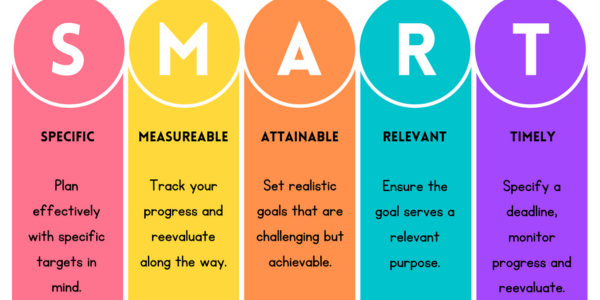The start of a new year is like opening a fresh notebook—full of possibilities and big plans for the future. But let’s be honest: New Year’s resolutions can be a bit dicey. Studies show that only about 9% of people feel successful in achieving their resolutions by the end of the year. That’s a pretty small club, but don’t worry—I’m here to help you join it.
And hey, while we’re on the topic of resolutions, I’m just going to throw it out there: I hope one of your goals this year is to come to Jubilation more often. Whether it’s for fitness, fun, or both, I’d love to see you here. But no pressure—this blog is packed with tips to help you stick to any goal, whether it’s fitness-related or not. Let’s dive in and make this the year you crush your resolutions!
Step 1: Set Goals, Not Resolutions
One of the biggest reasons resolutions fail is that they’re often too vague or unrealistic. Instead of saying, “I want to eat healthier” or “I’ll work out more,” try turning those ideas into SMART goals—Specific, Measurable, Achievable, Relevant, and Time-bound. For example, instead of a generic goal to “eat healthier,” commit to “meal prepping lunches every Sunday for January.”

Here’s a personal example: My husband and I set a fun, SMART goal this year to try a new restaurant every month. It’s specific, it’s measurable (hello, 12 restaurants!), and it’s a delicious way to keep ourselves accountable. Plus, it’s something we actually look forward to. The key is to create goals that inspire you and fit into your life—not ones that feel like a chore.
So, start by asking yourself: What would success look like for you in the next month, six months, or year? Then, turn that vision into a SMART goal. You’ll be surprised how much easier it is to stick to when you know exactly what you’re working toward!
Step 2: Think Short-Term
It’s tempting to set big, year-long resolutions, but let’s face it—that can feel overwhelming fast. Instead, focus on shorter-term goals that let you build momentum. Starting with a goal for just January (or even one week) can make your resolution feel more achievable and help you stay on track.
Here’s an example from my own life: Every January, I set a personal challenge I call my “no drive-through” goal. For one month, I skip the convenience of fast-food drive-throughs and focus on cooking at home or making intentional choices when dining out. It’s a manageable, time-bound challenge that helps me reset my habits without feeling like I’m giving up my favorite takeout forever.
The beauty of shorter-term goals is that they’re flexible and give you quick wins to celebrate. Plus, once you’ve conquered one month, you’ll feel more confident taking on the next. So, ask yourself: What’s one small, focused goal you can commit to this month? The answer might just be the perfect first step toward a successful year.
Step 3: Enlist a Buddy to Keep You Accountable
Let’s face it—sticking to resolutions on your own can be tough. That’s where an accountability buddy comes in. Whether it’s a friend, partner, coworker, or family member, having someone to share your goals with can make a huge difference. They’ll cheer you on, keep you motivated, and maybe even join you in reaching their own goals.

And here’s a little tip that might help (not to sound like a sales pitch!) At Jubilation, we offer three free class passes if you bring a new friend to join you. Just ask us in studio! It’s a fun way to stay committed to your fitness or wellness goals while introducing someone to a community that’s all about encouragement and joy.
On that note, I’m setting one of my own goals this year—to write a blog post every week (writing is my trade, after all!). So, how about you all be my accountability buddies for this? If you notice me slacking, feel free to call me out—I’ll appreciate the nudge!
Accountability buddies don’t just help you stick to your goals—they make the process more enjoyable. Whether you’re hitting the gym together, sharing meal prep tips, or just texting each other to check in, having someone on your side can be the key to success. So, who’s your buddy going to be this year?
Step 4: Track Your Progress and Celebrate Small Wins
Tracking your progress is one of the most effective ways to stay motivated and stick to your goals. Whether it’s using a journal, an app, or a calendar, seeing your progress visually can remind you how far you’ve come. And don’t forget the most important part—celebrating your small wins along the way!
Here’s a fun story: When I was in my personal training certification course, my instructor mentioned that even her “most manly” clients loved using sticker charts to track their progress. It may sound simple, but there’s something incredibly satisfying about adding a sticker to mark a job well done. I took that advice to heart and started using a sticker chart myself to celebrate my little wins. Spoiler alert: It works!
To make it even more fun, I’ve set up a personal reward system. Every time I complete a full sticker chart, I treat myself to a silly t-shirt. It’s a lighthearted way to acknowledge my progress and keep myself motivated for the next round.
It doesn’t have to be a sticker chart—choose a method that makes you feel good about your progress. Maybe it’s crossing off days on a calendar, tracking streaks in an app, or rewarding yourself with a treat when you hit a milestone. The key is to keep your wins visible and celebrate them, no matter how small they may seem. Progress is progress, and it deserves to be recognized!
Step 5: Be Kind to Yourself
Nobody’s perfect, and sticking to your goals doesn’t mean you won’t face setbacks along the way. One of the most important things you can do for yourself is to show kindness and understanding when things don’t go as planned. If you miss a day or fall off track, don’t let it spiral into guilt or giving up. Instead, focus on getting back on track and moving forward.
Think of it this way: Progress isn’t about being flawless—it’s about making consistent effort over time. Every small step you take still brings you closer to your goal, even if you stumble along the way. Use those moments as an opportunity to reflect. Did the goal need adjustment? Was the timeline too ambitious? What can you tweak to make it more manageable?
Conclusion
Sticking to your New Year’s resolutions doesn’t have to feel overwhelming. By setting SMART goals, breaking them into smaller steps, enlisting accountability, tracking your progress, and giving yourself grace when things don’t go perfectly, you can turn your aspirations into achievable milestones.
Remember, progress isn’t about perfection—it’s about consistent effort. Celebrate the small wins, find joy in the process, and keep moving forward. So, what’s your first step toward success this year? Whatever it is, I’m cheering you on—and if Jubilation is part of your plan, I’ll see you there! Let’s make this year your best one yet.


